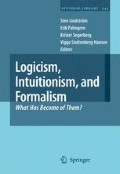Abstract
Dini’s theorem says that compactness of the domain, a metric space, ensures the uniform convergence of every simply convergent monotone sequence of uniformly continuous real-valued functions whose limit is uniformly continuous. By showing that it is equivalent to Brouwer’s fan theorem for detachable bars, we provide Dini’s theorem with a classification in the constructive reverse mathematics recently propagated by Ishihara. If the functions occurring in Dini’s theorem are pointwise continuous but integer-valued, then to still obtain such a classification we need to replace the fan theorem by the principle that every pointwise continuous integer-valued function on the Cantor space is uniformly continuous. As a complement, Dini’s theorem both for pointwise and uniformly continuous functions is proved to be equivalent to the analogue of the fan theorem, weak König’s lemma, in the classical setting of reverse mathematics started by Friedman and Simpson.
Access this chapter
Tax calculation will be finalised at checkout
Purchases are for personal use only
Preview
Unable to display preview. Download preview PDF.
References
Berger, J., Constructive equivalents of the uniform continuity theorem. J. UCS 11, 1878–1883, 2005
Berger, J., and P. Schuster, Classifying Dini’s theorem. Notre Dame J. Formal Logic 47, 253–262, 2006
Bishop, E., Foundations of Constructive Analysis. McGraw–Hill, New York, 1967
Bishop, E., and D. Bridges, Constructive Analysis. Springer, Berlin etc., 1985
Bridges, D.S., Dini’s theorem: a constructive case study. In: C.S. Calude et al., eds., Combinatorics, Computability and Logic. 3rd International Conference DMTCS01, Constanţa, Romania, 2001. Proceedings. Springer, London, 69–80, 2001
Bridges, D., and F. Richman, Varieties of Constructive Mathematics. Cambridge University Press, Cambridge, 1987
Dummett, M., Elements of Intuitionism. 2nd ed., Oxford University Press, Oxford, 2000
Ishihara, H., Informal constructive reverse mathematics. Sūrikaisekikenkyūsho Kōkyūroku 1381, 108–117, 2004
Ishihara, H., Constructive reverse mathematics: compactness properties. In: L. Crosilla et al., eds., From Sets and Types to Topology and Analysis. Oxford University Press, Oxford, 245–267, 2005
Ishihara, H., Weak König’s lemma implies Brouwer’s fan theorem: a direct proof. Notre Dame J. Formal Logic 47, 249–252, 2006
Ishihara, H., Reverse mathematics in Bishop’s constructive mathematics. Philosophia Scientiae, cahier special 6 (2006), 43–59
Julian, W.H., and F. Richman, A uniformly continuous function on [0,1] which is everywhere different from its infimum. Pacific J. Math 111, 333–340, 1984
Kohlenbach, U., Mathematically strong subsystems of analysis with low rate of growth of provably recursive functionals. Arch. Math. Logic. 36, 31–71, 1996
Kohlenbach, U., The use of a logical principle of uniform boundedness in analysis. In: A. Cantini et al., eds., Logic and Foundations of Mathematics. Kluwer, Dordrecht, 93–106, 1999
Loeb, I., Equivalents of the (weak) fan theorem. Ann. Pure Appl. Logic 132, 51–66, 2005
Richman, F., Intuitionism as generalization. Philos. Math. 5, 124–128, 1990
Richman, F., The fundamental theorem of algebra: a constructive development without choice. Pacific J. Math. 196, 213–230, 2000
Richman, F., Constructive mathematics without choice. In: P. Schuster et al., eds., Reuniting the Antipodes. Constructive and Nonstandard Views of the Continuum. Kluwer, Dordrecht, 199–205, 2001
Simpson, S.G., Subsystems of Second Order Arithmetic. Springer, Berlin etc., 1999
Troelstra, A.S., and D. van Dalen, Constructivism in Mathematics. Two volumes. North-Holland, Amsterdam, 1988
Veldman, W., Brouwer’s fan theorem as an axiom and as a contrast to Kleene’s alternative. Preprint, Radboud University, Nijmegen, 2005
Author information
Authors and Affiliations
Editor information
Editors and Affiliations
Rights and permissions
Copyright information
© 2009 Springer Science+Business Media B.V.
About this chapter
Cite this chapter
Berger, J., Schuster, P. (2009). Dini’s Theorem in the Light of Reverse Mathematics. In: Lindström, S., Palmgren, E., Segerberg, K., Stoltenberg-Hansen, V. (eds) Logicism, Intuitionism, and Formalism. Synthese Library, vol 341. Springer, Dordrecht. https://doi.org/10.1007/978-1-4020-8926-8_7
Download citation
DOI: https://doi.org/10.1007/978-1-4020-8926-8_7
Publisher Name: Springer, Dordrecht
Print ISBN: 978-1-4020-8925-1
Online ISBN: 978-1-4020-8926-8
eBook Packages: Mathematics and StatisticsMathematics and Statistics (R0)

